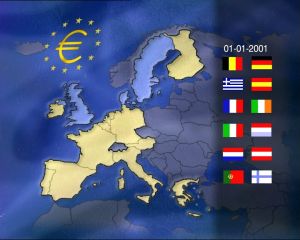|
Week of December 3, 2001 Snapshot from the Field |
|
Start of Euro Push?  Blair Urges Embrace of Europe,
By JACK LYNEBlasts Failures of Past UK Policies Site Selection Executive Editor of Interactive Publishing BIRMINGHAM, England -- In a speech ripe with potential site selection ramifications, British Prime Minister Tony Blair recently urged his nation to substantially strengthen its connection with Europe. Many observers, in fact, interpreted Blair's strongly worded remarks as the opening salvo in a campaign for UK membership in the European Monetary Union (EMU). "We vacated a decisive role in shaping the single currency, its timing, the Maastricht convergence criteria and the European Central Bank," Blair (pictured above) said in his speech to the European Research Institute in Birmingham.
Britain has a "history of missed opportunities" in Europe, Blair asserted in a speech to the European Research Institute in Birmingham. One of those missed opportunities, he asserted, was the nation's failure to participate in shaping the European Union's monetary policy.
'We Squandered Our Sovereignty' Even with that hedge on EMU membership, though, Blair's speech strongly lambasted past UK policies toward Europe. He traced in detail a rocky relationship spanning 50-plus years."The tragedy for British politics and for Britain is that too many politicians have consistently failed . . . to appreciate the reality of European integration, and in so doing they have failed Britain's interests," Blair said. "When we isolated ourselves in the past, we squandered our sovereignty, leaving us sole masters of a shrinking sphere of influence. . . . We must be whole-hearted, not half-hearted, partners in Europe. . . . Britain has no economic future outside Europe." Blair maintained, however, that a more proactive role doesn't mean abandoning sovereignty. "Sovereignty has to be deployed for national advantage," he said. "It is true that British governments have shared sovereignty over some decisions. But we have retained control over our immigration policy and national border controls, our tax, defense and foreign policies, and will continue to do so. . . . "We have a vision for Europe: as a union of nations working more closely together, not a federal superstate submerging national identity," he continued. "It is the right vision for Europe. Let us have the confidence to go out and win support for it." Critic: 'Back to Boom and Bust'  Reactions to Blair's speech covered a broad gamut, most centered on the euro. Reactions to Blair's speech covered a broad gamut, most centered on the euro.
"We do not have to join the euro to be a constructive and influential member of the EU," responded Ian Davidson, a Labor Party member of Parliament. "Locking into the euro would lead to a loss of economic control and take us back to boom and bust, which we've worked so hard to overcome." On the other hand, John Edmonds, general secretary of the UK's 700,000-member GMB union, called the speech a "positive statement" that "clearly shows that [EMU membership] is a matter of when and not if." Blair didn't go far enough, contended Matthew Taylor, a Liberal Democrat member of Parliament. Putting off pushing for the euro is costing the UK jobs, he charged. Blair "must show a firm lead and set a date for a referendum," Taylor said. "Locking into the euro would lead to a loss of economic control and take us back to boom and bust, which we've worked so hard to overcome," said Ian Davidson (pictured above), a Labor Party member of Parliament.
Blair made no mention of a referendum date in his Birmingham speech. Reportedly, Roger Liddle, Blair's chief EU policy adviser, recently told Labor Party members of Parliament that the government was leaning toward a spring 2003 euro referendum. Liddle, however, has since denied making the statement.
Some Firms Restive, But UK  The EU's emergence prompted many companies to consolidate many European operations into regional centers. And the common currency's introduction prompted some firms to increasingly locate within the euro zone, seeking advantages such as pricing transparency. The EU's emergence prompted many companies to consolidate many European operations into regional centers. And the common currency's introduction prompted some firms to increasingly locate within the euro zone, seeking advantages such as pricing transparency.
More recent EMU concerns, though, have centered on the euro's weakness against the pound. (Late last week, one pound converted to 1.6 euros.) As a result, Toyota last year told its UK suppliers to settle all bills using the euro. GMB's Edmonds called the decision "further evidence that business as a whole is moving towards the euro." The UK, Denmark and Sweden (coded in light blue in the map above) are the only three of the EU's 15 member nations that have opted out of the European common currency.
Companies with UK operations have also been restive regarding the euro question.
©2001 Conway Data, Inc. All rights reserved. Data is from many sources and is not warranted to be accurate or current.
|